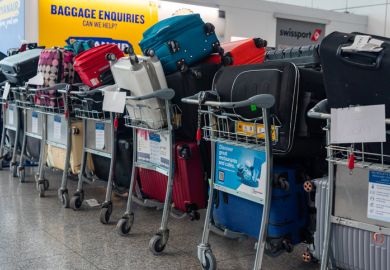The introduction of a minimum income threshold to restrict European Union workers living in the UK would be a significant barrier to scientists, the MP in charge of scrutinising the government on Brexit has warned.
Giving the annual lecture of the Campaign for Science and Engineering in London on 23 November, Hilary Benn said that while he had “no doubt” that the 3 million EU citizens living in the UK will be able to stay, there is a question mark over whether “a future immigration system after Brexit allows talent to continue to come in to the UK”.
The chair of the House of Commons Exiting the European Union Select Committee highlighted the fact that earlier this month Brexit secretary David Davis promised bankers a special post-Brexit travel regime to allow them to move freely across Europe.
“I would simply say if he can offer that assurance to those in financial services, I see no reason at all why it shouldn’t also be offered to scientists and engineers,” he said.
However, he warned that if the UK’s future immigration system includes “some kind of minimum income threshold, while bankers may not find that much of a hurdle, some scientists and researchers with skills that we really, really need in this country, might struggle to make it here”.
Currently, high-skilled workers from outside the EU must earn a minimum of £30,000 per year in order to qualify for a five-year visa in the UK.
“Ministers need to reassure all of us that this will not be the case and that also it is their firm intention to remain part of the Erasmus student exchange programme after we leave, because I think that would send a powerful signal that the UK wants to remain a connected nation and a world leader in higher education,” he said.
The Labour MP for Leeds Central also rejected the notion that “special pleading” from universities would have a detrimental impact on the wider public’s view of the higher education sector.
“Each sector has to make its voice heard. It’s not about special pleading, it’s about what’s important for your sector,” he said, adding that there is “a cacophony of voices seeking to talk about Brexit” with ministers.
Mr Benn suggested that whether the UK remains part of Horizon 2020 and future EU research funding programmes would not necessarily be contingent on whether there is freedom of movement.
When asked whether the two issues were connected in a “black and white way”, Mr Benn said: “I’m not clear that is a black and white line. If we think that it is the right thing to do, and I do and I’m sure you do, too, then that is something that we should pursue with vigour. Of course, what we have to offer the 27 member states is money in return for our participation.”
Register to continue
Why register?
- Registration is free and only takes a moment
- Once registered, you can read 3 articles a month
- Sign up for our newsletter
Subscribe
Or subscribe for unlimited access to:
- Unlimited access to news, views, insights & reviews
- Digital editions
- Digital access to THE’s university and college rankings analysis
Already registered or a current subscriber?








